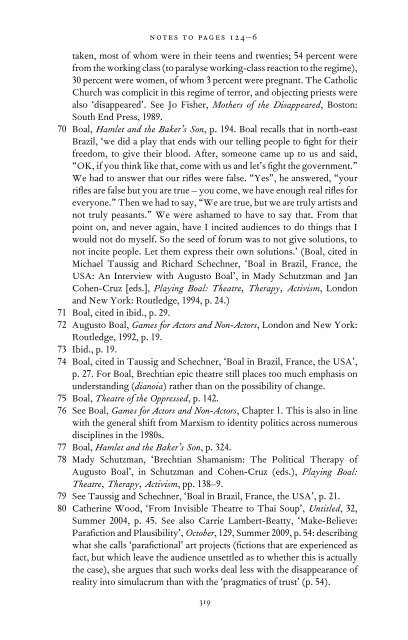Participatory Art and the Politics of Spectatorship - autonomous ...
Participatory Art and the Politics of Spectatorship - autonomous ...
Participatory Art and the Politics of Spectatorship - autonomous ...
You also want an ePaper? Increase the reach of your titles
YUMPU automatically turns print PDFs into web optimized ePapers that Google loves.
notes to pages 124– 6<br />
taken, most <strong>of</strong> whom were in <strong>the</strong>ir teens <strong>and</strong> twenties; 54 percent were<br />
from <strong>the</strong> working class (to paralyse working- class reaction to <strong>the</strong> regime),<br />
30 percent were women, <strong>of</strong> whom 3 percent were pregnant. The Catholic<br />
Church was complicit in this regime <strong>of</strong> terror, <strong>and</strong> objecting priests were<br />
also ‘disappeared’. See Jo Fisher, Mo<strong>the</strong>rs <strong>of</strong> <strong>the</strong> Disappeared, Boston:<br />
South End Press, 1989.<br />
70 Boal, Hamlet <strong>and</strong> <strong>the</strong> Baker’s Son, p. 194. Boal recalls that in north-east<br />
Brazil, ‘we did a play that ends with our telling people to fi ght for <strong>the</strong>ir<br />
freedom, to give <strong>the</strong>ir blood. After, someone came up to us <strong>and</strong> said,<br />
“OK, if you think like that, come with us <strong>and</strong> let’s fi ght <strong>the</strong> government.”<br />
We had to answer that our rifl es were false. “Yes”, he answered, “your<br />
rifl es are false but you are true – you come, we have enough real rifl es for<br />
everyone.” Then we had to say, “We are true, but we are truly artists <strong>and</strong><br />
not truly peasants.” We were ashamed to have to say that. From that<br />
point on, <strong>and</strong> never again, have I incited audiences to do things that I<br />
would not do myself. So <strong>the</strong> seed <strong>of</strong> forum was to not give solutions, to<br />
not incite people. Let <strong>the</strong>m express <strong>the</strong>ir own solutions.’ (Boal, cited in<br />
Michael Taussig <strong>and</strong> Richard Schechner, ‘Boal in Brazil, France, <strong>the</strong><br />
USA: An Interview with Augusto Boal’, in Mady Schutzman <strong>and</strong> Jan<br />
Cohen- Cruz [eds.], Playing Boal: Theatre, Therapy, Activism, London<br />
<strong>and</strong> New York: Routledge, 1994, p. 24.)<br />
71 Boal, cited in ibid., p. 29.<br />
72 Augusto Boal, Games for Actors <strong>and</strong> Non- Actors, London <strong>and</strong> New York:<br />
Routledge, 1992, p. 19.<br />
73 Ibid., p. 19.<br />
74 Boal, cited in Taussig <strong>and</strong> Schechner, ‘Boal in Brazil, France, <strong>the</strong> USA’,<br />
p. 27. For Boal, Brechtian epic <strong>the</strong>atre still places too much emphasis on<br />
underst<strong>and</strong>ing (dianoia) ra<strong>the</strong>r than on <strong>the</strong> possibility <strong>of</strong> change.<br />
75 Boal, Theatre <strong>of</strong> <strong>the</strong> Oppressed, p. 142.<br />
76 See Boal, Games for Actors <strong>and</strong> Non- Actors, Chapter 1. This is also in line<br />
with <strong>the</strong> general shift from Marxism to identity politics across numerous<br />
disciplines in <strong>the</strong> 1980s.<br />
77 Boal, Hamlet <strong>and</strong> <strong>the</strong> Baker’s Son, p. 324.<br />
78 Mady Schutzman, ‘Brechtian Shamanism: The Political Therapy <strong>of</strong><br />
Augusto Boal’, in Schutzman <strong>and</strong> Cohen- Cruz (eds.), Playing Boal:<br />
Theatre, Therapy, Activism, pp. 138– 9.<br />
79 See Taussig <strong>and</strong> Schechner, ‘Boal in Brazil, France, <strong>the</strong> USA’, p. 21.<br />
80 Ca<strong>the</strong>rine Wood, ‘From Invisible Theatre to Thai Soup’, Untitled, 32,<br />
Summer 2004, p. 45. See also Carrie Lambert- Beatty, ‘Make- Believe:<br />
Parafi ction <strong>and</strong> Plausibility’, October, 129, Summer 2009, p. 54: describing<br />
what she calls ‘parafi ctional’ art projects (fi ctions that are experienced as<br />
fact, but which leave <strong>the</strong> audience unsettled as to whe<strong>the</strong>r this is actually<br />
<strong>the</strong> case), she argues that such works deal less with <strong>the</strong> disappearance <strong>of</strong><br />
reality into simulacrum than with <strong>the</strong> ‘pragmatics <strong>of</strong> trust’ (p. 54).<br />
319
















